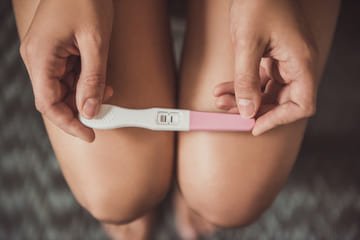
Biochemical pregnancy - how to recognize it and how to prevent it
Have you ever heard of the term biochemical pregnancy or chemical pregnancy? This term is related to a positive pregnancy test, which usually signals that a woman is pregnant. At the same time, however, biochemical pregnancy is associated with miscarriage in the early stages of pregnancy. Today's super sensitive pregnancy tests can detect this type of pregnancy, but in reality this pregnancy lasts no longer than 5-6 weeks and ends in early miscarriage. The symptoms of such a pregnancy cannot yet be observed even during an ultrasound examination. What is a biochemical pregnancy? Is another pregnancy possible after a biochemical pregnancy?
- What is a biochemical pregnancy?
- How to recognize a biochemical pregnancy
- Biochemical pregnancy and its causes
- Risk factors for chemical pregnancy
- Pregnancy after biochemical pregnancy
- How to prevent biochemical pregnancy - prevention
- Biochemical pregnancy - experiences
- The most frequent questions - FAQ
- Comments
Many couples think of assisted or artificial insemination when they hear the phrase biochemical pregnancy. In fact, it is a completely different specific type of pregnancy that can affect any type of reproduction and any woman. Despite the fact that the result of a biochemical pregnancy is a miscarriage, it is quite common for symptoms characteristic of the beginning of a standard pregnancy to appear in the early stages of pregnancy. However, the feelings and symptoms related to such a pregnancy end with the arrival of menstruation. Based on research and statistics, it is assumed that every fourth pregnancy ends in miscarriage, even before the woman notices it. Why does this type of pregnancy occur? Can biochemical pregnancy be prevented?
What is a biochemical pregnancy?
A chemical pregnancy or a biochemical pregnancy is one that disappears even before it enters the clinical phase, i.e. it ends by the 5th-6th week of pregnancy. The symptoms of such a pregnancy cannot yet be observed even with an ultrasound examination. It is possible to observe pregnancy by ultrasound only around the 6th-8th week. In this case, however, the whole process begins with the successful fertilization of the egg by sperm, the phase of migration to the uterus begins, where the egg wants to implant, the process of division (where errors occur) takes place, and during this period there will be no successful implantation in the uterus.
The fetus cannot develop successfully because the egg has not settled firmly enough on the lining of the uterus and cannot prevent bleeding during the menstrual cycle. There can be more reasons why such a situation occurs. Despite the symptoms of pregnancy, the biochemical pregnancy ends with bleeding - menstruation, and there is a miscarriage and the expulsion of the egg. Several women indicate a delayed menstruation and a stronger intensity of bleeding. A large number of women may not even notice a biochemical pregnancy, so it is difficult to determine what percentage of spontaneous abortions is actually a biochemical pregnancy.
Statistics and research speak quite clearly. Approximately 30% of pregnancies end in the successful birth of a child. Approximately 30% of pregnancies end in the death of the fertilized egg, while it does not even implant in the uterus. According to some research, up to 50-75% of spontaneous abortions can be attributed to biochemical pregnancy. These abortions usually end by the 5th week of pregnancy, at which time they cannot yet be confirmed by an ultrasound examination. The rest of the abortions already have a clinical character, while the next largest part of the abortions happens after the 12th week of pregnancy.

Biochemical pregnancy and a positive pregnancy test
Heavy menstruation and a positive pregnancy test don't go well together, but they are fairly typical signals for a biochemical pregnancy. If the partners are trying for a baby and after the pregnancy test two lines appear or one strong and the other only slightly visible (the so-called ghost), this means a positive result in any case. If it is not a false positive caused by other factors. During implantation, the production of the hCG hormone increases. Precisely its increased level can be detected by sensitive urine pregnancy tests. However, it often happens that a repeated test (in 2-3 days) will already show a negative result, because the level of hCG drops rapidly in this type of pregnancy. During a visit to the gynecologist, the pregnancy is not confirmed, because nothing can be observed on the ultrasound at this stage.
Clinical vs biochemical pregnancy
From a medical point of view, it is important to perceive the difference between clinical and biochemical pregnancy. The above-mentioned production of the hCG hormone is related to the implantation of the egg in the uterus. However, the fundamental difference is that, while in a clinical pregnancy the hCG hormone level increases approximately every 48 hours, during a biochemical pregnancy the hCG level only increases slightly and gradually decreases. A biochemical pregnancy is considered one that is not confirmed by ultrasound and usually ends within the 5th-6th week. Any pregnancy that is detected by ultrasound, definitively around 8-12 weeks, is already considered clinical. The doctor observes the gestational sac, the fetus, or its heart sounds on the ultrasound.

How to recognize a biochemical pregnancy
The problem with biochemical pregnancy is that it is difficult for a woman to identify it, and most women do not even know that they have experienced such a pregnancy. The reason for the difficulty in determining that such a pregnancy is taking place is that it is the initial phase of pregnancy. Women who closely monitor their bodies may notice certain deviations in the behavior of their bodies. If they don't know about biochemical pregnancy, most of the time, even certain symptoms will pass in silence. A positive pregnancy test may not be authoritative. It can be a clue if one of the lines is very weak. A repeated test in 2 or 3 days may show a negative result due to the decreasing level of hCG.
Delayed menstruation, even by 7 days, is considered a symptom of biochemical pregnancy. Some women reported more intense and longer bleeding. Breast pain, bloating or pain in the lower abdomen or cramps may appear. However, these accompanying symptoms are very often also typical for standard menstruation. At the moment when menstruation occurs, women do not even realize that a biochemical pregnancy may have occurred. Therefore, most women do not notice biochemical pregnancy and perceive it only as a stronger menstruation.
Biochemical pregnancy and its causes
Every woman must realize that a biochemical pregnancy is in no way her fault and she is definitely not responsible for it. Research has shown primarily that such pregnancies end mainly due to chromosomal abnormalities. These abnormalities are responsible for the fact that the fetus - embryo cannot develop properly. These abnormalities occur during cell division.
The more serious they are, the lower the chance of a successful pregnancy, and nature itself will take care of the exclusion of the fertilized egg - zygote. Chromosomal deviations are related to a disproportionate number of chromosomes – 23 from the mother and 23 from the father. At this stage, however, the fertilized egg does not have enough chromosomes or has too many of them, and this causes genetic disorders in the fetus. A common cause is also the unsuccessful implantation of a fertilized egg into the uterus, whereby the egg does not attach stably to the lining of the uterus and dies due to insufficient nutrition. The result can be spontaneous abortion - biochemical pregnancy up to 5-6 weeks.
In cases where women do not manage to get pregnant and experience similar symptoms similar to biochemical pregnancy more often, it is necessary to seek the help of a specialist. However, there is no need to panic, the reason may not only be genetics, but also the risk factors listed below. Many of them can be treated.

Risk factors for chemical pregnancy
Early miscarriage can also be caused by other reasons, which can also cause biochemical pregnancy and early miscarriage. The cause can also be:
- ectopic pregnancy,
- hormonal imbalance,
- venereal diseases,
- frequent infections and inflammations,
- autoimmune diseases,
- blood clotting disorder,
- low body weight of a woman,
- dysfunction of the thyroid gland,
- the woman's age over 35 years,
- the presence of an intrauterine body,
- bad spermiogram of a man,
- untreated diabetes,
- smoking, alcohol, drugs, stress,
- injury to the mother in the early stages of pregnancy.
Pregnancy after biochemical pregnancy
Many women fear that if they have overcome a biochemical pregnancy, they will not be able to get pregnant again. However, a biochemical pregnancy does not mean that a woman is subsequently unable to become pregnant. Spontaneous abortion in the case of chemical pregnancy has its reasons, but the chances of pregnancy are still high and in most cases biochemical pregnancy has no effect on the woman's fertility.
The menstrual cycle will return to a stable mode, the ovulation stage will also take place, and the woman and her partner can continue to try to get pregnant again, while there is no reason to wait with repeated attempts to get pregnant. However, you can consult your gynecologist, because there may be other reasons why an early miscarriage occurred.
Under normal circumstances, a biochemical pregnancy does not require any treatment or medical intervention. In some cases, at the discretion of the gynecologist, curettage may be necessary. After this cleaning, it is necessary to wait at least 3 months before trying to get pregnant again.

How to prevent biochemical pregnancy - prevention
Based on risk factors, it is possible to avoid some risks of biochemical pregnancy, but there is no systematic or effective prevention to prevent early abortion. In principle, it is possible to speak only on a general level. Maintain a healthy lifestyle, improve your eating habits, avoid smoking, alcohol and try to take in a sufficient amount of minerals or vitamins. Support your body with an increased intake of folic acid, which reduces the risk of spontaneous abortion and has a positive effect on the later development of the fetus. Avoid excessive stress.
Biochemical pregnancy - experiences
Women's experiences in connection with biochemical pregnancy are very specific. Above all, in the discussions, it is a problem to identify the presence of chemical pregnancy. Also, women often decide whether it is possible to get pregnant again after overcoming a biochemical pregnancy. Several women consulted their gynecologist about biochemical pregnancy, who advised them on suitable vitamins and also prescribed preventive checks. However, women confirm that pregnancy after an early miscarriage is highly probable. It is appropriate to wait if the woman has undergone curettage - cleaning.
The most frequent questions - FAQ
Do you know what biochemical pregnancy is? How to recognize a chemical pregnancy? Can it be prevented? Do you have experience with abortion in the early stages of pregnancy? Biochemical pregnancy is a very sensitive topic for women. The biggest betrayal is that many women may not even notice that they have experienced a biochemical pregnancy. What are your opinions? We will be happy if you share your knowledge on this issue. Below the article you have the opportunity to join the discussion. We would appreciate it if you could contribute to this topic.
What is a biochemical pregnancy?
How to recognize biochemical pregnancy?
What is the level of hCG in a biochemical pregnancy?
What is menstruation like in a biochemical pregnancy?
Pridať komentár






